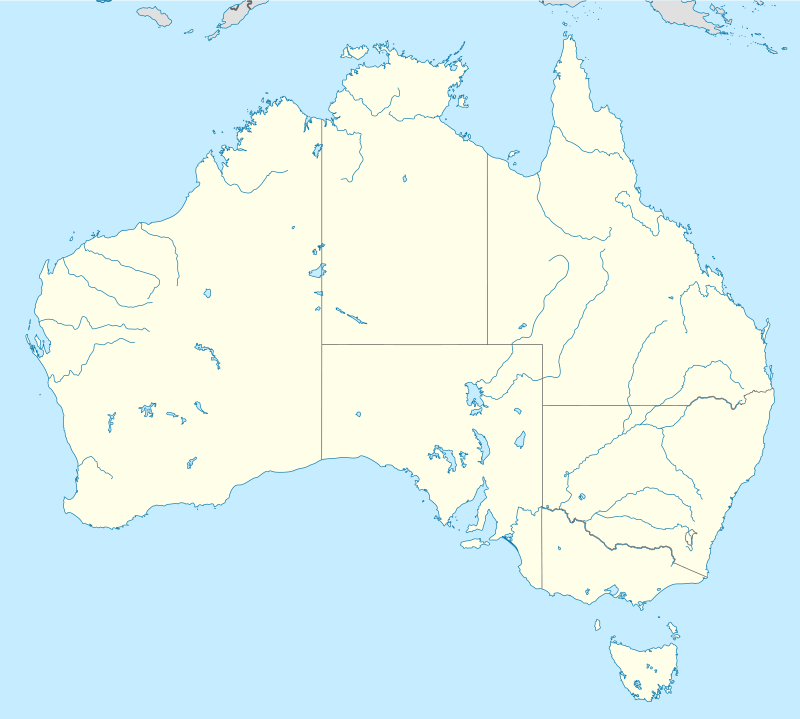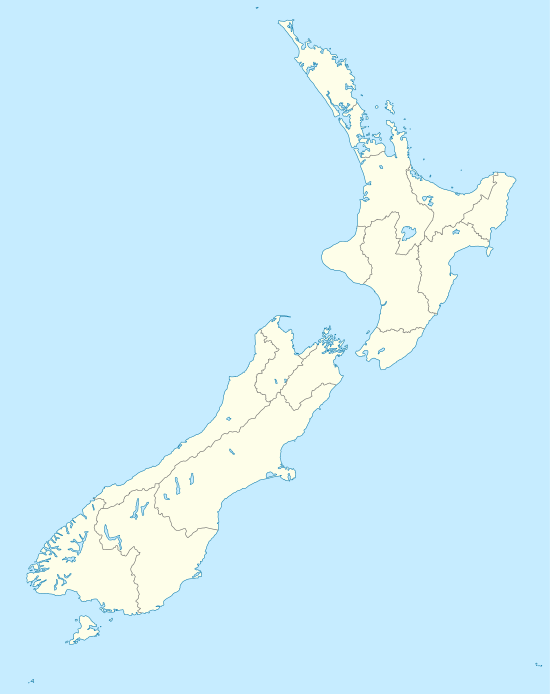2023 FIFA Women's World Cup
The 2023 FIFA Women's World Cup (Māori: 2023 FIFA Wāhine O Te Ao) will be the 9th edition of the FIFA Women's World Cup, the quadrennial world championship for women's national football teams organised by FIFA. The tournament will be jointly hosted by Australia and New Zealand, during a reserved period in the FIFA Women's International Match Calendar between 10 July and 20 August 2023.[1] The 2023 tournament will see the Women's World Cup expanded from 24 to 32 teams.
| 2023 FIFA Wāhine O Te Ao | |
|---|---|
 Bid logo | |
| Tournament details | |
| Host countries | Australia New Zealand |
| Dates | July – August |
| Teams | 32 (from 6 confederations) |
The United States are the defending champions going into the competition, having won the previous two tournaments in 2015 and 2019.
Host selection
On 19 February 2019, FIFA announced that bidding had begun for the 2023 FIFA Women's World Cup.[2] Member associations interested in hosting the tournament had to submit a declaration of interest by 15 March 2019, and provide the completed bidding registration by 16 April 2019. However, as the tournament expanded to 32 teams on 31 July 2019, FIFA revised the bidding timeline.[3] Other member associations interested in hosting the tournament now had until 16 August 2019 to submit a declaration of interest, while the completed bidding registration of new member associations and re-confirmation of prior bidders had to be provided by 2 September 2019.[4]
Initially, nine countries indicated interest in hosting the events: Argentina, Australia, Bolivia, Brazil, Colombia, Japan, South Korea (with interest in a joint bid with North Korea), New Zealand and South Africa.[5] Following the new deadline, Belgium expressed interest in hosting the tournament, but later dropped out with Bolivia in September 2019.[6][7] Australia and New Zealand later announced they would merge their bids in a joint submission.[8] They were joined by Brazil, Colombia, and Japan in submitting the bid books to FIFA by 13 December 2019.[9] However, both Brazil and Japan later withdrew their bids in June 2020 prior to the final voting.[10][11]
On 25 June 2020, Australia and New Zealand officially won the bid to host the Women's World Cup.[12] The decision came after a vote by the FIFA Council, with the winning bid earning 22 votes, while Colombia earned 13.[13] Neither country had previously hosted a senior FIFA tournament. This will be the first Women's World Cup to be hosted in multiple countries, and only the second World Cup tournament to do so, following the 2002 FIFA World Cup. It will also be the first FIFA Women's World Cup held in the southern hemisphere, the first senior FIFA tournament to be held in Oceania, and the first FIFA tournament to be hosted across multiple confederations (with Australia in the AFC and New Zealand in the OFC). Australia is the second association from the AFC to host the Women's World Cup, after China in both 1991 and 2007.
Format
In July 2019, FIFA President Gianni Infantino proposed an expansion of the Women's World Cup from 24 to 32 teams, possibly starting with the 2023 edition, as well as doubling the tournament's prize money.[14] The proposal came following the success of the 2019 FIFA Women's World Cup and the prior edition of the tournament in 2015, which after increasing from 16 to 24 teams set an attendance record for all FIFA competitions besides the men's FIFA World Cup.[15] Expanding the tournament to allow a eight additional participating teams was seen to give more member associations a greater opportunity to qualify for the final tournament. This fostered the growing reach and professionalisation of the women's game.[16]
On 31 July 2019, the FIFA Council unanimously decided to expand the tournament to 32 teams, featuring eight groups of four.[3]
The astounding success of this year's FIFA Women's World Cup in France made it very clear that this is the time to keep the momentum going and take concrete steps to foster the growth of women's football. I am glad to see this proposal becoming a reality.
The tournament will open with a group stage consisting of eight groups of four teams, with the top two teams progressing from each group to a knockout tournament starting with a round of 16 teams. The number of games played overall will increase from 52 to 64. The tournament replicates the format of the FIFA World Cup used between 1998 and 2022.
Qualification
Australia and New Zealand automatically qualified for the tournament as co-hosts. Qualifying matches are scheduled to start in 2021 and end in 2022.
On 9 December 2019, the World Anti-Doping Agency handed Russia a four-year ban from all major sporting events, after RUSADA was found non-compliant for handing over manipulated lab data to investigators.[17] However, the Russia national team could still enter qualification, as the ban only applies to the final tournament to decide the world champions. If Russia were to qualify, Russian footballers could still potentially compete at the tournament, pending a decision from FIFA. However, a team representing Russia, which uses the Russian flag and anthem, cannot participate under the current WADA decision.[18] The decision is pending appeal to the Court of Arbitration for Sport.[19]
Qualified teams
The following teams qualified for the final tournament.
| Team | Qualified as | Qualification date | Appearance in finals |
Consecutive streak |
Previous best performance |
|---|---|---|---|---|---|
| Hosts | 25 June 2020 | 8th | 8 | Quarter-finals (2007, 2011, 2015) | |
| Hosts | 25 June 2020 | 6th | 5 | Group stage (1991, 2007, 2011, 2015, 2019) |
Venues
Australia and New Zealand proposed 13 possible venues across 12 host cities for the tournament in the Bid Book submitted to FIFA, suggesting a minimum of 10 stadiums be used — five in each country.[20] The final selection of venues will be decided by FIFA. Eden Park in Auckland was suggested to host the opening game, with Stadium Australia in Sydney proposed for the 2023 Women's World Cup final match.[21]
| Sydney | Brisbane | Melbourne | |||
|---|---|---|---|---|---|
| Stadium Australia | Sydney Football Stadium | Brisbane Stadium | Melbourne Rectangular Stadium | ||
| Capacity: 70,000 (current capacity: 82,500) |
Capacity: 42,512 (under construction) |
Capacity: 52,263 | Capacity: 30,052 | ||
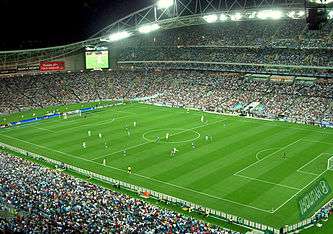 |
 |
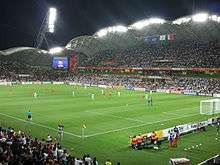 | |||
| Newcastle | Perth | Launceston | Adelaide | ||
| Newcastle Stadium | Perth Rectangular Stadium | York Park | Hindmarsh Stadium | ||
| Capacity: 25,945 | Capacity: 22,225 | Capacity: 22,065 | Capacity: 18,435 | ||
 |
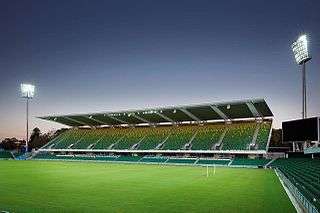 |
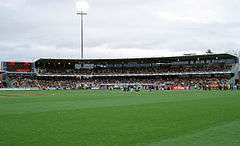 |
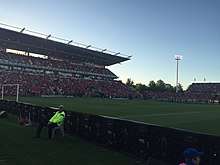 | ||
| Australia | New Zealand | ||||
| Auckland | Wellington | Dunedin | Hamilton | Christchurch | |
| Eden Park | Wellington Stadium | Dunedin Stadium | Waikato Stadium | Christchurch Stadium | |
| Capacity: 48,276 | Capacity: 39,000 | Capacity: 28,744 (indoor) | Capacity: 25,111 | Capacity: 22,556 | |
.jpg) |
.jpg) |
.jpg) |
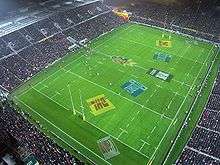 |
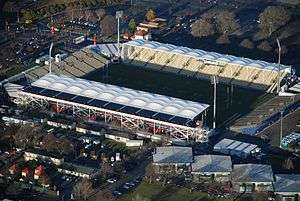 | |
References
- "Women's international match calendar 2020–2023" (PDF). FIFA.com. Fédération Internationale de Football Association. 6 November 2018. p. 8. Retrieved 24 July 2019.
- "FIFA starts bidding process for FIFA Women's World Cup 2023". FIFA.com. Fédération Internationale de Football Association. 19 February 2019.
- "FIFA Council unanimously approves expanded 32-team field for FIFA Women's World Cup". FIFA.com. Fédération Internationale de Football Association. 31 July 2019. Retrieved 31 July 2019.
- "FIFA Women's World Cup 2023: Overview of the bidding process (updated version, August 2019)" (PDF). FIFA.com. Fédération Internationale de Football Association. 3 September 2019. Retrieved 3 September 2019.
- "FIFA receives record number of expressions of interest in hosting FIFA Women's World Cup 2023". FIFA.com. Fédération Internationale de Football Association. 18 March 2019. Retrieved 19 March 2019.
- "Belgium and Bolivia drop out as eight countries remain in race to host 2023 FIFA Women's World Cup". insidethegames.biz. 3 September 2019.
- "Bidding process for FIFA Women's World Cup 2023 continues with eight member associations". FIFA.com. Fédération Internationale de Football Association. 3 September 2019. Retrieved 3 September 2019.
- "One Vision". As One 2023. Football Federation Australia. Retrieved 12 December 2019.
- "FIFA Women's World Cup 2023: four bids submitted". FIFA.com. Fédération Internationale de Football Association. 13 December 2019.
- "Brasil retira candidatura à sede da Copa do Mundo Feminina FIFA 2023" (in Portuguese). Brazilian Football Confederation. 8 June 2020.
- "Japan FA to withdraw from Bid to host the FIFA Women's World Cup 2023". Japan Football Association. 22 June 2020. Archived from the original on 23 June 2020.
- "Australia and New Zealand selected as hosts of FIFA Women's World Cup 2023". FIFA.com. Fédération Internationale de Football Association. 25 June 2020. Retrieved 25 June 2020.
- "FIFA Women's World Cup 2023 Voting Results" (PDF). FIFA.com. Fédération Internationale de Football Association. 25 June 2020. Retrieved 25 June 2020.
- "FIFA President Infantino hails France 2019, outlines proposals for future of women's game". FIFA.com. Fédération Internationale de Football Association. 5 July 2019. Retrieved 5 July 2019.
- "Key figures from the FIFA Women's World Cup Canada 2015™". FIFA. 7 July 2015. Retrieved 3 October 2016.
- "FIFA President Proposes Expansion of Women's World Cup and Doubling of Prize Money". nytimes.com. Retrieved 28 June 2020.
- "Russia banned for four years to include 2020 Olympics and 2022 World Cup". BBC Sport. 9 December 2019.
- "'We Got What We Deserved': Russia Reacts to Doping Ban". The Moscow Times. 9 December 2019.
- "WADA files official request with Court of Arbitration for Sport to resolve RUSADA dispute". World Anti-Doping Agency. 9 January 2020. Retrieved 14 February 2020.
- "As One. Australia and New Zealand bidding to host the FIFA Women's World Cup 2023" (PDF). Football Federation Australia, New Zealand Football. Retrieved 14 December 2019 – via FIFA.com.
- "Australia and New Zealand are hosting the FIFA 2023 Women's World Cup. Here's how the tournament will work". abc.net.au. Retrieved 26 June 2020.
- "FIFA extending TV deals through 2026 World Cup with CTV, TSN and RDS". The Globe and Mail. 12 February 2015.
- Sandomir, Richard (12 January 2015). "Fox and Telemundo to Show World Cup Through 2026 as FIFA Extends Contracts". New York Times. Archived from the original on 3 January 2020. Retrieved 3 January 2020.
- Parker, Ryan (13 February 2015). "2026 World Cup TV rights awarded without bids; ESPN 'surprised'". Los Angeles Times.
